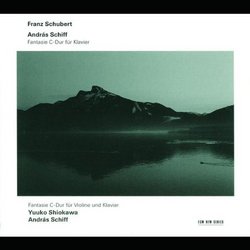| All Artists: Franz [Vienna] Schubert, András Schiff Title: Schubert: Fantasie C-Dur für Klavier; Fantasie C-Dur für Violine und Klavier Members Wishing: 1 Total Copies: 0 Label: Ecm Import Release Date: 6/13/2000 Album Type: Import Genre: Classical Styles: Chamber Music, Forms & Genres, Fantasies, Historical Periods, Classical (c.1770-1830), Instruments, Strings Number of Discs: 1 SwapaCD Credits: 1 UPCs: 028946432020, 002894643202 |
Search - Franz [Vienna] Schubert, András Schiff :: Schubert: Fantasie C-Dur für Klavier; Fantasie C-Dur für Violine und Klavier
 | Franz [Vienna] Schubert, András Schiff Schubert: Fantasie C-Dur für Klavier; Fantasie C-Dur für Violine und Klavier Genre: Classical Despite their basic differences, these two Schubert Fantasies share certain characteristics: the title, the tonality, a set of variations on a song, and a somewhat uneasy combination of flamboyant virtuosity and intimate i... more » |
Larger Image |
